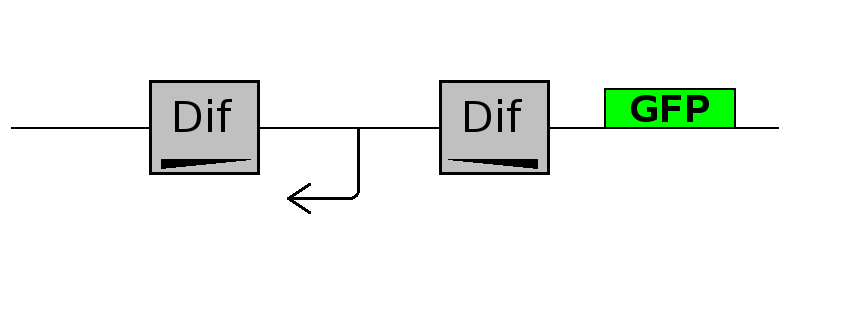Edinburgh/DivisionPopper
From 2007.igem.org
(→Current Device Idea) |
|||
| Line 15: | Line 15: | ||
This can then be hooked up to another device such as a counter. | This can then be hooked up to another device such as a counter. | ||
| - | This device realise on dif sites flipping only once per division. In it's current configuration, Promoter A is repressed by represser A which is continually being produced. | + | This device realise on dif sites flipping only once per division. In it's current configuration, <font color="blue">'''Promoter A'''</font> is repressed by <font color="blue">'''represser A'''</font> which is continually being produced. At this time there is no <font color="orange">'''represser B'''</font> being produced. |
| - | When cell division occurs, the section of DNA between the two dif sites gets reversed. Initially there is no represser B present in the cell so promoter B is able to produce an output of PoPS. As time goes on represser B gets produced and 'turns off' promoter B. At the same time represser A is no longer being produced and degrades | + | When cell division occurs, the section of DNA between the two dif sites gets reversed. Initially there is no <font color="orange">'''represser B'''</font> present in the cell so <font color="orange">'''promoter B'''</font> is able to produce an output of PoPS. As time goes on <font color="orange">'''represser B'''</font> gets produced and 'turns off' <font color="orange">'''promoter B'''</font>. At the same time <font color="blue">'''represser A'''</font> is no longer being produced and degrades so when the next division occurs, <font color="blue">'''promoter A'''</font> will be capable of producing a PoPS output and the process repeats. |
===Assumptions=== | ===Assumptions=== | ||
Revision as of 10:07, 18 July 2007
https://static.igem.org/mediawiki/2007/f/f5/800px-Edinburgh_City_15_mod.JPG
Contents |
Bacterial counter
The idea is to use a variety of recombinases to delete or invert sections of DNA and use this to count or trigger the expression of genes.
Project Goal
The aim is to produce output as a function of cell division. This can have the added potential of performing programmed cell death after a determined number of cell divisions. We also hope to further analyse cell division and recombinase mechanisms.
Current Device Idea
This device should output a PoPS signal every time a cell division occurs This can then be hooked up to another device such as a counter.
This device realise on dif sites flipping only once per division. In it's current configuration, Promoter A is repressed by represser A which is continually being produced. At this time there is no represser B being produced.
When cell division occurs, the section of DNA between the two dif sites gets reversed. Initially there is no represser B present in the cell so promoter B is able to produce an output of PoPS. As time goes on represser B gets produced and 'turns off' promoter B. At the same time represser A is no longer being produced and degrades so when the next division occurs, promoter A will be capable of producing a PoPS output and the process repeats.
Assumptions
- The Dif sites flip only once during cell division
- Repressors A and B are produced and degrade faster than the cell cycle
- Promoter B does not interfere with the production of represser A
Initial Experiments
As stated before, the device relies on the dif site flipping only once per cell division. To test whether or not this actually happens, we have devised two simpler experiments.
Exp 1
This experiment will prove whether or not the DNA between the two dif sites flip at all during cell division. If the a flip occurs, then the direction the promoter operates will be changed and GFP will be expressed.
Exp 2
This will prove whether or not it flips once during division, this will require fast degrading fluorescent proteins


